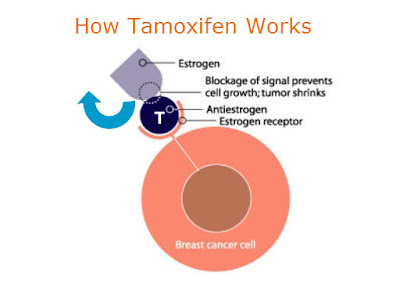I have to tell you that I was (note the tense) doing well on Tamoxifen. It was hard on my GI system and kidneys, which are somewhat wrecked from all the medical treatment. (Tests say I have external renal pelvises and large shoulders, which means swollen, basically, but functioning ok). Tami caused periodic radical joint pain, but eased other pains, so that was a trade-off. My hair looked great (but impossibly curly), my nails began to recover, and I had a sense of wellness I haven't had for a while. That was my experience. I know what you're thinking: Amazing, given that I'm the side-effect queen. I actually felt like my body was getting something that it hadn't had for a while.
Then, it began. As the weather warmed, so did heart palpitations. Heart palps means your heart is not beating correctly, either through skipped beats or improper beating rhythm. They were small at first, then truly demanding. It was impossible to sleep. I spent an entire out-of-state conference adjusting the thyroid medications followed by the Tamoxifen, and trying to deal with symptoms. After several weeks of controlled experimenting, I am forced to the conclusion that the Tamoxifen is causing them, or at least, tripping the trigger that causes them. So, I've stopped, for now.
 |
| The Tamoxifen Mechanism |
So here's my humble theory of what's happening:
Most thyroid doctors (endocrinologists) prescribe only one medication for thyroid hormone replacement: T4, known by the brand names Synthroid or Levoxyl. It is believed that the body then sends that medication through a series of transformations, so the body can make use of it: T4 to T3, 2, 1 and five other hormones, all with a specific function.
Recent research, as well as the voice of millions of patients, suggests that this transformation happens ineffectively in some of us, or not at all. One group strongly promotes a different, older formulation of thyroid meds, made of dessicated pig thyroid, called natural dessicated thyroid (NDT) as more effective. Most doctors, however, either dismiss these concerns and the research, or they add Cytomel, the T3 medication.
I am one of those people who needs it. I feel a strong difference when I add T3 to my regimen. I can't find a doctor willing to suggest the NDT, but I'd welcome the opportunity.
There is also research that suggests that Tamoxifen affects the synthesis of T4 and the way it binds to receptors. That's what I think was happening to me: It changed the way it binds, so that my hormone cascade happened much more efficiently. That's why I felt well. Eventually, however, I built too much thyroid medication in my system, so I became "hyperthyroid." There are a series of symptoms, but one of them is heart palpitations.
Now, I get to fight a battle to get cross-discipline treatment. I need my oncologist and my endocrinologist to work with each other to find me a solution. They do talk to each other, but this issue is like nothing they've seen before.
Right now, however, my endo is waiting for another test to make a decision: which brings me to my other cancer fun. It's testing time again. Time to dust off my cancer elephant because he's going to make an appearance in my life.
First, there's the thyroid: I've had a couple of suspicious neck lymph nodes show up on tests for the past few years. If they are the same size now, we're good. If they're bigger, that could mean recurrence and surgery. Even if they aren't cancer, I think surgery may be a good idea. Thyroid recurrence is a bit different than BrCA recurrence -- it means more annoying surgery, possible loss of voice or nerves or other side effects, but usually it doesn't mean much more than that. You can spend 20 years chasing thyroid cancer around your body, and die of something else altogether. Still, who wants that ever?
Remember that I have other things to worry about as well. I have a mammogram or (more likely) MRI in my near future, the ultrasound on my neck lymph nodes, and I have to get my oophrectomy soon, everyone agrees.
I was able to put my cancer elephant mostly on the shelf while I went on a wonderful vacation, and for that I'm grateful. I've been refocusing my bid for progress at work.
But time to get back at that hidden life, taming my cancer elephant, managing my life through the worries of testing and treatments. I'll dutifully go for each test or procedure, and I'll watch faces for reactions. (I could have played poker with all of my surgeons, I swear. They all have no bluff faces whatsoever.) I'll have sleep meds at the ready, so that I can keep fighting my progress battle at work, because it's better than panicking, anyway. I will wake up at 5 a.m. anyway, when the batch file with my test results runs and sends a notice to my health app. I'll be unable to resist reading the test findings because I'll have been up all night despite the meds.
I will try to tame the elephant back on the shelf, even though he's really big and wants to annoy me. This is the normal world of a cancer survivor.
Did I mention my mother-in-law is hospice with end stage cancer? It doesn't rain....
Don't forget to share your thoughts here, on Facebook or Inspire.


